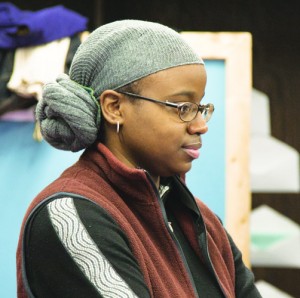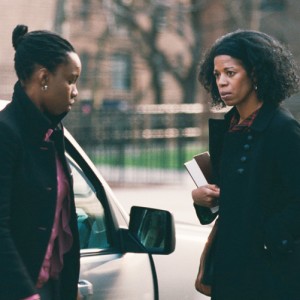Woman of the Year
With the much-anticipated national release of her vivid debut feature Pariah, Dee Rees provides the pièce de résistance to a remarkable year for women in film—and gives a cinematic gift to us all.
By Steven Foster

Let the men hang their head in shame. At last, the studio execs—yes, the arrested-adolescent, cash-crazed, art-challenged idiots of the Hollywood boys club who continually greenlight Battleships that suck your soul and Transformers that turn your brain to mush—may finally have had their (predominantly white) asses handed to them. By women. Because 2011 was a fantastic year in film for the fairer sex.
The phenomenon of Bridesmaids sharply proved that ladies could play dirty and truly clean up in the dick-centric domain of R-rated comedy, raking in an astounding $169 billion in domestic grosses and critical accolades for Kristen Wiig’s hilarious film with heart. Add to that the $119 billion foreign, and you’re getting close to box office receipts that would make Michael Bay start looking for a training bra. The Help wasn’t far behind with its $203 billion worldwide haul. And Help, by the way, grabbed all that loot with a cast that was “mixed race and 99 percent women,” as star Viola Davis so pointedly put it to Entertainment Weekly.
And now, wrapping up the year, bearing down on awards season, is the astute and assured Pariah, the story of a young African-American teenager named Alike (pronounced ah-LEE-kay) coming to terms with a sexuality that doesn’t quite fit inside the lesbian system she tentatively orbits and certainly doesn’t fly at home. Not only is the universe of Pariah populated with an entirely black, predominantly female cast, it was written and directed by Dee Rees, a young black lesbian who gave the most buzzed-about directing debut of the year. The film also received rapturous appreciation for lead Adepero Oduye as Alike, and for Kim Wayans who all but obliterated her previous comedian persona with a devastating turn playing Alike’s lonely and increasingly desperate mother.
Steven Foster spoke with Dee Rees just as her film breaks in wide release, after already stunning the Sundance crowd, winning the prestigious Gotham Independent Film Award for Breakthrough Director, and capturing two Independent Spirit Awards nods. The film opens at Houston’s Sundance Cinema (sundancecinemas.com) on January 13.
Steven Foster: I feel it’s almost an injustice to shorthand the film as a black lesbian coming-of-age story. It seems the true essence is about identity and coming to grips and dealing with the embrace of one’s own personhood. The film’s message transcends any gender, race, or sexual box a casual glance might want to put it in.
Dee Rees: Absolutely. When we [the producers] talk about the film, we say this is a film about identity. It’s about a girl trying to find herself. We think anyone can relate to the film. You don’t have to be gay, you don’t have to be black to really get to know these characters. She’s just someone who’s trying to be her most perfect self, to not succumb to the peer pressure, to who her friends want her to be, or who her parents want her to be. She’s just trying to figure out what’s right for her. It’s a story that tries to transcend all those boundaries and engage people.
However, if you were to categorize early champions of your film, what group did you feel the most support from? Was it women? The African-American community? The LGBT crowd?
I’d say it was a cross section of communities that supported the film, much like the cross section of audiences that have responded to it. When we first premiered the film at Sundance, it was more like an art house crowd. Then we played a couple of gay and lesbian film festivals, and then we played a couple of people of color festivals. I think in the process it was all communities coming together and were seeing their stories told. We found that it was a film that appealed to a broad section of people even though it’s a very specific story. But I’d say at the beginning, it was a cross section of LGBT and African-American communities that really got behind the film.
Do you think people are surprised by the film’s humor? I really hadn’t expected it to be so funny. And it is, very often, extremely funny.
Yeah. And we wanted to subvert people’s expectations at every level. You hear the title, you see the poster, and you think the film is one thing. And then the opening scene happens and you think, “Oh this is just another, you know, hip hop movie” which then transforms to “Oh, this is a coming-out story” and then you think “Oh, this is a love story.” Every time you think you have an idea of what the film is, it changes—just in the film itself, in terms of the coloring, the way the film is shot, the performances, the sense of humor. So you come in thinking one thing, and you leave feeling another.

I was stunned when I found out how old [lead actress] Adepero Oduye really is.
[Laughing] Yeah.
Honestly, when I read it, I thought it was a typo.
Yeah, she put in a complete transformation for the film. It’s not a documentary. Adepero is a true actress, and really put a lot of craft into the film. She really immersed herself into Alike completely. It was important that [audiences] would feel like they were in that experience with her, and her performance does such an amazing job of that.
Since the film is semi-autobiographical, how much of Alike is like you?
I’d say, um, like Alike, I loved to write growing up. I liked to write poetry, and that was kind of my outlet to say things that I couldn’t really say. I grew up in Nashville, Tennessee, in the suburbs, and she grew up in Brooklyn, so obviously the world was different. But there are personal attributes that we have in common. And we both realized that you don’t have to be butch, you don’t have to be femme, you can be somewhere in between. Also the realization that our spirituality and our sexuality didn’t have to be mutually exclusive. That was something that I had to realize in my own coming out.
Society tries so hard to put everyone in a certain box, and I love it that your film refutes that and basically says, “No, actually, you can make your own box.”
Exactly, yeah, exactly. Not being who people want you to be, even if those people are coming from a place of love. Like the mother, she comes from a place of love wanting her to be something that she’s not. And it just kinda shows how people in our lives can be coming from a well-meaning place but still not necessarily know who we are, or not allowing us to be free and be ourselves.
So how much is Alike’s family like your family?
Um, I guess to the extent that we both come from a middle-class upbringing, I guess that’s similar. But I’d say the similarities end there.
The rest of the cast is equally amazing. They’re all such strong performances by truly gifted actors. Were you surprised by Kim Wayans’ audition for Audrey?
I wasn’t surprised, no. Because we’d seen a lot of Audreys and nobody was getting it, you know? Everybody was giving these stereotypes of the angry black mom; they weren’t getting the nuance. And Kim was the first actress who came in who tapped into the loneliness and vulnerability of Audrey. She nailed it.
What do you like most about the filmmaking process?
Working with the actors. Just kind of, like, doing exercises beforehand and seeing them find out who the characters are and what the characters are about. Because that’s the point at which you know the story’s being transformed, that it’s coming to life from this thing you wrote on the page to this thing with people and bodies moving in front of you. You know, seeing the emotions spelled out. It’s really kind of intense and very moving.
What part do you just hate?
Um. I suppose just waiting to raise the money, I guess. That’s the part where you have to package it, to try and put it in a box so that people understand it. I hate asking for money.
One last question. I don’t want to say the line here, because I don’t want to deny anyone the power of hearing it for the first time. But when I heard Alike say it in the film, it was like a gut punch. And I confess that I kinda get a lump in my throat every time I replay it in my head. That line, “_____________.” When did you write that? Was that the character speaking through you? Or was that you?
Um, I just wrote it. I guess it needed to be made clear to the audience [what Alike was doing]. I don’t know; it just came out. I just wrote it. It just needed to be said. Yeah. [Laughs]
Well, it’s amazing. When I walked out of the movie I just kept thinking, “Fuck. I wish I would have written that.”
[Laughs]
Pariah opens at Houston’s Sundance Cinema (sundancecinemas.com) on Friday, January 13.
Steven Foster is a regular contributor to OutSmart magazine.










